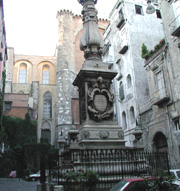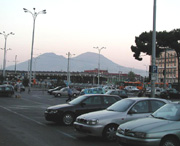意大利城市-那不勒斯
(单词翻译:单击)
Naples (Italy)
 Naples is raucous1(乱哄哄的), polluted, anarchic, deafening2, crumbling3 and grubby(肮脏的). It's also a lot of fun. Superbly positioned on a bay, Naples has a little - and often a lot - of everything. It pulsates(有规律地跳动)with noisy street markets and swarms4 of people buzzing around on Vespas(小型摩托车)with no regard for traffic rules. Naples is raucous1(乱哄哄的), polluted, anarchic, deafening2, crumbling3 and grubby(肮脏的). It's also a lot of fun. Superbly positioned on a bay, Naples has a little - and often a lot - of everything. It pulsates(有规律地跳动)with noisy street markets and swarms4 of people buzzing around on Vespas(小型摩托车)with no regard for traffic rules.
The old centre bristles5 with ancient churches, a medieval university and countless6 eateries and cafes. It also has a reputation for organised crime. But the city forges on, powered by the sheer zest7 and vitality8 of its inhabitants. Despite its faults, Naples might be 'the loveliest spot in Europe'. The best time to visit is from April to June, when prices are lower. Late July and August is the time to avoid Italy altogether - the weather boils, prices are inflated9 and the whole country swarms with holidaymakers. Most Italians go on holiday in August, abandoning the cities and leaving many shops, hotels and restaurants closed. Soon after founding Cumae in 1000 BC, colonists10 from Rhodes established a settlement on the western side of Mt Vesuvius(维苏威火山). Many centuries later, Phoenician traders(腓尼基商人)from present day Lebanon and Greeks from Athens were attracted by the splendour of the coast and so expanded the settlement, christening it Neapolis (New City). It thrived as a centre of Greek culture and later, under Roman rule, became a favourite of emperors Pompey, Caesar and Tiberius.
In 1503 Naples and the Kingdom of Sicily were absorbed by Spain, which sent viceroys(总督)to reign12 as virtual dictators. Despite their heavy-handed rule, Naples flourished artistically13 and acquired much of its splendour during this period. Indeed it continued to flower when the Spanish Bourbons(波旁皇族)reestablished Naples as capital of the Kingdom of the Two Sicilies in 1734. Aside from a Napoleonic interlude (1806 to 1815), the Bourbons remained until 1860, when they were unseated by Garibaldi and the Kingdom of Italy. The city was heavily damaged during more than 100 bombing raids in WWII - marks can still be seen on many monuments. The Allies subsequently presided over a disastrous14 period of transition from war to peace - many observers have since attributed the initial boom in the city's organised crime, at least in part, to members of the occupying forces. A severe earthquake in 1980 and the dormant15, but not extinct Vesuvius looming16 to the east, remind Neapolitans of their city's vulnerability. |
 收听单词发音
收听单词发音
1
raucous

|
|
| adj.(声音)沙哑的,粗糙的 | |
参考例句: |
|
|
|
2
deafening

|
|
| adj. 振耳欲聋的, 极喧闹的 动词deafen的现在分词形式 | |
参考例句: |
|
|
|
3
crumbling

|
|
| adj.摇摇欲坠的 | |
参考例句: |
|
|
|
4
swarms

|
|
| 蜂群,一大群( swarm的名词复数 ) | |
参考例句: |
|
|
|
5
bristles

|
|
| 短而硬的毛发,刷子毛( bristle的名词复数 ) | |
参考例句: |
|
|
|
6
countless

|
|
| adj.无数的,多得不计其数的 | |
参考例句: |
|
|
|
7
zest

|
|
| n.乐趣;滋味,风味;兴趣 | |
参考例句: |
|
|
|
8
vitality

|
|
| n.活力,生命力,效力 | |
参考例句: |
|
|
|
9
inflated

|
|
| adj.(价格)飞涨的;(通货)膨胀的;言过其实的;充了气的v.使充气(于轮胎、气球等)( inflate的过去式和过去分词 );(使)膨胀;(使)通货膨胀;物价上涨 | |
参考例句: |
|
|
|
10
colonists

|
|
| n.殖民地开拓者,移民,殖民地居民( colonist的名词复数 ) | |
参考例句: |
|
|
|
11
prosper

|
|
| v.成功,兴隆,昌盛;使成功,使昌隆,繁荣 | |
参考例句: |
|
|
|
12
reign

|
|
| n.统治时期,统治,支配,盛行;v.占优势 | |
参考例句: |
|
|
|
13
artistically

|
|
| adv.艺术性地 | |
参考例句: |
|
|
|
14
disastrous

|
|
| adj.灾难性的,造成灾害的;极坏的,很糟的 | |
参考例句: |
|
|
|
15
dormant

|
|
| adj.暂停活动的;休眠的;潜伏的 | |
参考例句: |
|
|
|
16
looming

|
|
| n.上现蜃景(光通过低层大气发生异常折射形成的一种海市蜃楼)v.隐约出现,阴森地逼近( loom的现在分词 );隐约出现,阴森地逼近 | |
参考例句: |
|
|
|
- 上一篇:德国城市-汉堡
- 下一篇:塞尔维亚首都-贝尔格莱德

 After successive waves of invasion by the wild Goths(哥特人)and a couple of spells under
After successive waves of invasion by the wild Goths(哥特人)and a couple of spells under 


